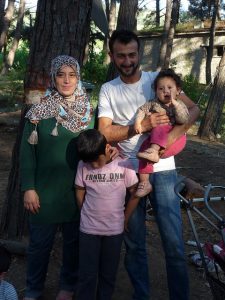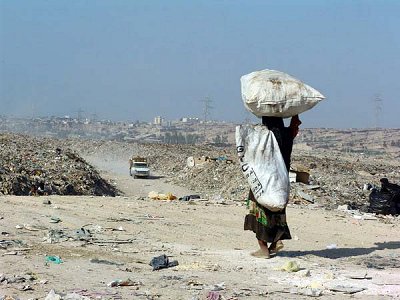RCL Reflection, Third Sunday in Lent, Year A
Lessons: Exodus 17:1-7, Psalm 95, Romans 5:1-11, John 4:5-42
Theme: God’s faithful and generous people learn about God’s economics, prodigal love, and preference for those on the margins. We learn that all are thirsty and hungry, and that in Christ, all will be nourished and thirst will be quenched.
Key Scripture: Jesus said to her, “Everyone who drinks of this water will be thirsty again, but those who drink of the water that I will give them will never be thirsty. The water that I will give will become in them a spring of water gushing up to eternal life.” John 4:13-14
Preaching/Teaching Reflection
She came to the well in broad daylight, bearing a heavy load of emotional scars, social stigmas, and outsider status. Yet still she came because she had to have water. Surely she was used to being judged, whispered about, and none-too-subtly avoided by the good citizens of this backwater Samaritan outpost. Yet still she  came, bearing her pain, carrying her jug, and wielding a battered but unbroken and feisty pride. A simple but absurd request for water from a strange man was the pivot point on which her entire life turned. Once again, Jesus crosses boundaries, cuts through fear, looks someone in the eye and reorients reality. He knew her place of need, and he met the woman there and lifted her to new life.
came, bearing her pain, carrying her jug, and wielding a battered but unbroken and feisty pride. A simple but absurd request for water from a strange man was the pivot point on which her entire life turned. Once again, Jesus crosses boundaries, cuts through fear, looks someone in the eye and reorients reality. He knew her place of need, and he met the woman there and lifted her to new life.
Yes, this week’s gospel lesson is a powerful story, and one that speaks to us today on so many levels. In many ways it seems like not a whole lot has changed about human behavior. We still make judgments and assumptions about folks who are “other” or “different,” particularly the marginalized and the ones who lack access to voice or power. Just listen to how people talk about the working poor in our own culture. You’ll hear plenty of heated rhetoric justifying why some people should be entitled to all the benefits of this land of plenty and while others deserve–choose even–to live in want. Fingers point and accusations fly about motivation, behaviors, and willpower (hand ‘em some bootstraps) that actually have more to do with defending positions of privilege.
Accuse me of being a “Pollyanna” or ridiculously naive if you will, but I hold fast to the hope and promise that there is enough for everybody to have basic needs met if we pay attention to how God’s economics work. In fact, our Lord shows a distinct preference for the poor, downtrodden, and marginalized, and he has no hesitation about breaking society’s rules or culture’s mores to draw the circle bigger and bring everyone to the table.
God took a small ragtag nation of people as the chosen ones, bringing them out of slavery, sustaining them in the desert, and putting up with all manner of nonsense over the course of time. Yes, in Jesus we have all been invited into that family of God, adopted as full heirs of the promise and guaranteed the gracious promise and providence of the Creator of the universe.
And yet…
We seem not to have learned from history; in fact, we continue to repeat past mistakes and fail (along with disciples, apostles, and a long lineage of faithful folk) to really understand the grand scope of God’s generosity. We welcome God’s goodness and providence in our own lives, and we’re willing to come to the table to be fed with the very body and blood of Jesus. We feast on the Word, often taking it for granted, while all around us people hunger in so many ways.
It is tough to see from the heights of privilege, and it’s a long way down to rock bottom. But see we must. To bear the name of Christian, we must see through Jesus’ eyes. In the Samaritan woman at the well we dare not see someone “other” or “less than” ourselves. Rather, mirrored in her eyes is the reflection of our own brokenness and shame. No one—absolutely no one—gets out of this life unscathed and unscarred. In the hungry and complaining Israelites whom God so graciously fed and watered in the wilderness we hear echoes of our own petulance and fear.
Everyone has worth and matters to God. We all hunger and thirst for the same basic things that only God can  provide. Our Creator is prodigally generous, meeting our needs, lifting us up from the muck of our own making, and claiming us as part of the family. Can we not extend that same generosity to our sisters and brothers in the name of Christ? Can we not hear Jesus’ words to his disciples later in this same gospel lesson reminding them about sowing and reaping and the interconnectedness of it all?
provide. Our Creator is prodigally generous, meeting our needs, lifting us up from the muck of our own making, and claiming us as part of the family. Can we not extend that same generosity to our sisters and brothers in the name of Christ? Can we not hear Jesus’ words to his disciples later in this same gospel lesson reminding them about sowing and reaping and the interconnectedness of it all?
There is enough. We can be generous, and we can believe in God’s gracious provision for all the world. All have worth and are created in the divine image. May we be bold–fearless–in feeding hungry hearts and quenching thirsty spirits while sharing and caring for one another’s basic needs. We are all thirsty people. May your heart be broken open by God rather than hardened by this world, so that you may pour out prodigal, quenching love without fear of being emptied. Amen.
In Worship
If you’re considering using the Old Testament lesson (Exodus 17:1-7) for your focus today, why not use this passage to tackle the subject of change? It’s easy to say we want change, but change is tough. And when the going gets tough, the people get, well, grumpy (to say the least). This story of Moses and the People of Israel in the desert offers a great note to riff off of present fears of change in the church. Congregations are often excited about change, but once they get through the “Red Sea” of excitement, living into change can be a pretty tough tromp through the wilderness.
What lessons can we take from this story? What does God have to say to us today as leaders and as communities? What kind of living water might be waiting to gush forth from the rocks of our resistance? Consider having a basket of different size rocks for people to choose from. Invite people to write their biggest fear about change in the church on that rock. Provide a time for people to place their rocks in a pile in a large metal washtub or glass bowl (choose a size appropriate to your congregation’s numbers and the size of the rocks you collect). Include a petition in the prayer for God to wash away the fears and resistance we feel and pour water over the rocks to cover them. Remind one another of the healing, cleansing, restorative power of water. Come to the makeshift rocky font, dip your fingers in amongst the rocks, and make the sign of the cross to remember your baptism. Be reminded that God equips us for change, Christ’s meal sustains us for the journey, and together by the power of the Holy Spirit we can weather whatever wilderness journey lies ahead. Water is stronger than the rocks of our resistance.
With Youth
Here’s a 10 minute video worth watching with your youth! “I am Second: Scott Hamilton” talks about how God is with us in the midst of adversity, always. Jesus met the woman at the well at the place of her deepest need. God did not abandon the people of Israel in the desert, even though they grumbled and complained. God never abandons us either. Consider watching this video in light of the Old Testament and Gospel lessons this week with attention to how God is working in our lives today. Ask youth where they have seen God at work. If you have someone in your congregation with a powerful experience of God’s providence and grace, ask him or her to join you and share it.
With Children
Where’s the Living Water?
Briefly recount the story of the woman at the well with Jesus. You can tell the children that some Christians give her a name, Photini. Talk about the living water that the woman requests from Jesus. Where can you find that water today? Most of us are a long way from Jacob’s well, and we can’t sit and talk with Jesus like Photini did. Is living water found in bottled water? (You might have a few kinds to compare–a basic spring water and a fancy water like Perrier.) No, of course not. Bottled water may be good, but it will quench your thirst only for a while. What about water from the tap or a fountain? No, of course not. Ask the children if there’s anywhere in the church where they might find “living water.” Take them to the font and talk about how in baptism we come into contact with living water. When we hear scripture, when we celebrate communion, we are exposed to the living waters of Jesus. Even the water in the font won’t quench our physical thirst forever, but when it’s combined with word in Baptism we indeed have living water. Allow the children to dip their fingers in the font and make the sign of the cross and then finish with a simple prayer.
Weekly Stewardship Bulletin Insert
Economics is a hotly debated topic. Who benefits from government and business decisions? Who is hurt? Can anyone bring relief to a sluggish economy and shrinking middle class? Who is our financial hero: someone red, someone blue, someone like me, or maybe like you? What in the world are God’s people to do? The answer is found in Jesus’ economy of abundance in a world of scarcity. As stewards of God’s economy, we are called to see above and beyond the financial fracas around us, to look and listen for God’s promise of enough and then some, and to live our lives accordingly: careful but not fearful, wise but ever hopeful.
Stewardship at Home
The story of the Samaritan woman provides a good opportunity for us to examine our beliefs and prejudices about people who are “other” than us. How do we respond to people living in poverty? How comfortable are we with people of different races and religions? What are our assumptions about immigrants and refugees?
This week choose one of the above categories (or another of your own choosing) and try to learn more about the lives of those who seem so different. For example, if you choose people living in poverty, consider watching the powerful 2012 documentary A Place at the Table. You can find it on YouTube here.
If you are interested in the refugee crisis, consider talking to someone from an organization in your community who is working with refugee resettlement such as Catholic Charities, Lutheran Immigration and Refugee Service, or Church World Service. Watch the 2016 documentary Exodus on Frontline. You might also want to watch one of these seven films. If you have younger children in your family or group, be sure to prescreen these films because of the subject matter.
Photos: Amir Farshad Ebrahimi, Ted, and Frantosek Trampota, Creative Commons. Thanks!
Note: Reprint rights granted to congregations and other church organizations for local, nonprofit use. Just include this note: “Copyright (c) 2017, Rev. Sharron Blezard. Used by Permission.” Other uses, please inquire: thewritelife@hotmail.com.




Leave a Reply